21 August 2025
11 minutes read
Full Form of GMAT GRE IELTS and TOEFL Exams, Difference Between GRE or GMAT Exam and Admission Tests for Indian Students

Key Takeaways
- Full form of GMAT GRE IELTS and TOEFL shows these are globally recognized exams essential for students applying to universities abroad.
- Full form of GMAT GRE IELTS and TOEFL helps international students understand admission test requirements for management, graduate, and language proficiency.
- Full form of GMAT GRE IELTS and TOEFL reveals why these exams remain crucial for transcripts, SOPs, and resumes in higher education applications.
The GMAT, GRE, SAT, ACT, IELTS, and TOEFL are great for the students who want to study outside their home country because they are standardized exams that test people’s abilities to learn in educational programs and in a language.
These exams provide a process for colleges to review applications and compare students from diverse educational venues to determine whether they fulfill the expectations of admitting students into demanding programs.
The GMAT and GRE measure verbal, quantitative, and critical abilities, which are needed to pursue graduate school and business school. Conversely, the IELTS and TOEFL measure English language skills, which are crucial for people who do not speak English as a first language and who are in an English speaking country.
Doing well on these tests, students can demonstrate preparedness and commitment to possible colleges, and it significantly increases their ability to be accepted and to be successful in their chosen academic fields.
Full form of GRE
The acronym GRE stands for Graduate Record Examinations. The GRE exam is a durable universal admission test for graduate schools and business programs across the globe.
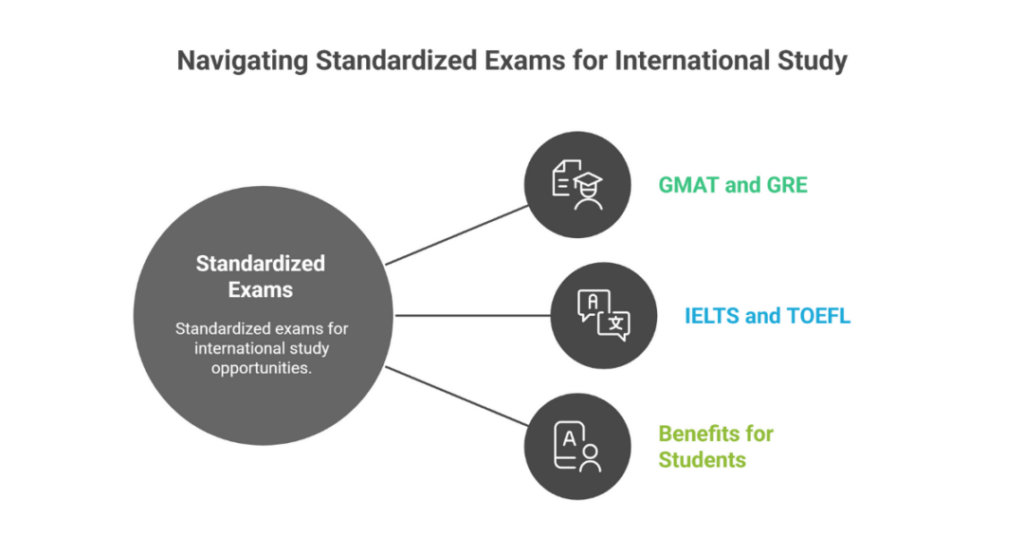
The GRE is particularly important for students wanting to study for an advanced degree abroad for several reasons:
Versatility
The GRE exam is widely accepted by thousands of graduate programs around the world including business schools for MBA programs. The GRE exam is beneficial because students looking for various programs in various subjects can use the same GRE test score and the same GRE application process.
Assessment of Key Skills
The GRE tests important skills that are necessary for success in graduate school, including:
- Analytical Writing: Analytical Writing assesses a candidate’s ability to express complex ideas in a clear and effective manner.
- Verbal Reasoning: Verbal Reasoning assesses skills in reading comprehension, critical reasoning, and vocabulary.
- Quantitative Reasoning: Quantitative Reasoning assesses basic mathematical skills and quantitative reasoning skills through interpretation and analysis.
- Score Choice: The GRE allows candidates to take the test multiple times, and decide which scores to send to schools using the ScoreSelect option.
GRE (Graduate Record Examination) Exam Eligibility
The Educational Testing Service (ETS) administers the tests, and does not stipulate guidelines to take the Graduate Record Examinations.
| Section | Number of Questions | Allotted Time |
|---|---|---|
| Analytical Writing | – Analyze an Issue task | 30 minutes per task |
| – Analyze an Argument task | ||
| Verbal Reasoning | 20 questions per section (2 sections) | 30 minutes per section |
| Quantitative Reasoning | 20 questions per section (2 sections) | 35 minutes per section |
| Unscored | Varies | Varies |
| Research | Varies | Varies |
Eligibility:
- Document Required: Valid passport (original) which states name, contains a photograph and signature.
- Other Requirements: ETS has no age, qualification or timing restrictions, although universities may have their specific rules.
Full form of GMAT
GMAT is short for Graduate Management Admission Test. The GMAT is one of the tests that is required for admission to many global business schools with graduate degrees and graduate-level business degrees such as MBA.
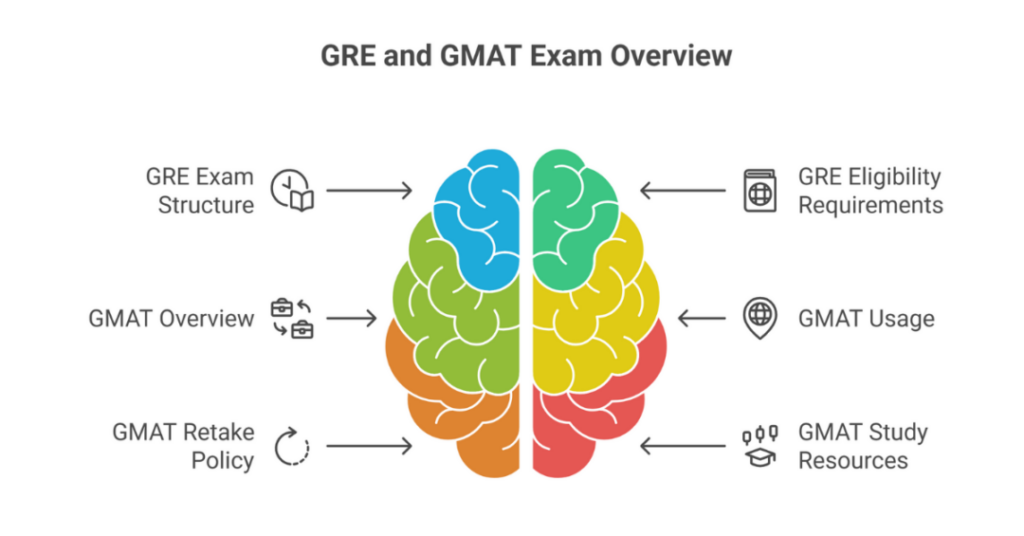
It aims to measure the skills that are necessary for successfully managing and developing business. The GMAT prep is used by over 7,000 graduate business schools almost all the other 2,300 graduate business schools located in 93 countries around the world.
As an admission requirement, the test can be re-taken as often as required, and its scores can go up if it is repeated. The test can be taken any time. Tutorials and practice exams are also offered, and even more available for students to study off of.
GMAT (Graduate Management Admission Test) Paper-Based Test Pattern 2024
An applicant who gets a high GMAT score, before applying to graduate business school, can help their application be stronger as it may signal that the student is prepared for business school challenges and help with admission to a prominent university.
| Section | Number of Questions | Allotted Time |
|---|---|---|
| Analytical Writing Assessment | 1 Essay | 30 minutes |
| Integrated Reasoning | 12 Questions | 30 minutes |
| Quantitative Reasoning | 31 Questions | 62 minutes |
| Verbal Reasoning | 36 Questions | 65 minutes |
Should I Take the GRE or GMAT?
The GRE (Graduate Record Examinations) and GMAT (Graduate Management Admission Test) plays an important role in the admissions process for a graduate program, as both have different purposes.
The GRE General Test, or the GRE Revised General Test, measures a wide-ranging ability in verbal and quantitative areas making it appropriate for many graduate programs from the arts, social sciences, to business. The GMAT is specifically designed for business and management programs.
Both GRE general test and GMAT allow for a paper-based test option, however, it is more common to encounter computer-based tests. The GRE has a general test and GRE Subject Tests (which evaluate knowledge in a particular situation) which makes it more versatile as well.
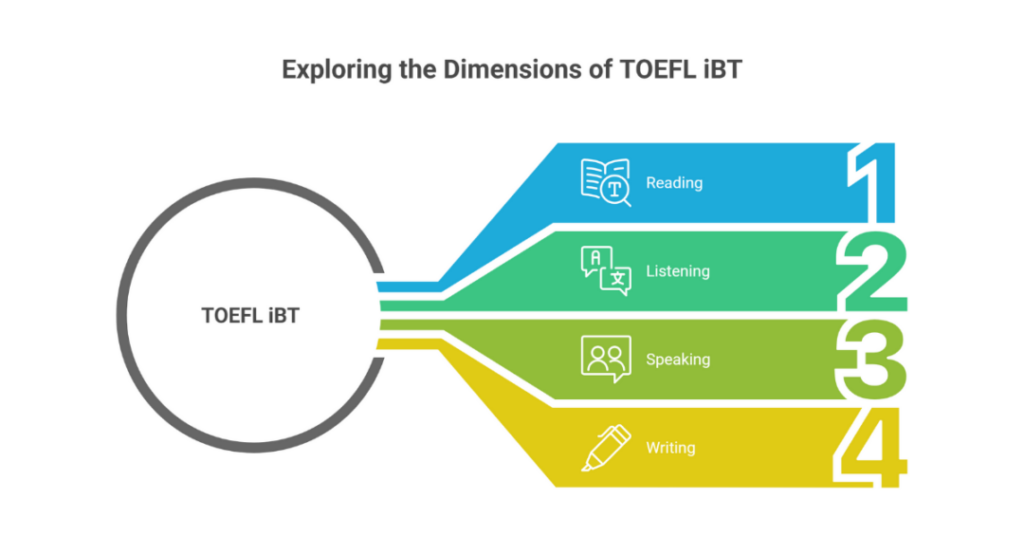
Both tests have different levels of difficulty (e.g. sometimes GRE tasks are more difficult than GMAT tasks) but both types of test are challenging.
The GRE provides a score for the verbal and quantitative sections in full 1-point increments, whereas the GMAT total score is composed of a score from 200-800. Understanding the differences between GRE and GMAT is important to choose the right admissions test on the basis of one’s personal academic goals and the admissions requirements of your prospective graduate programs.
| Aspect | GRE (Graduate Record Examinations) | GMAT (Graduate Management Admission Test) |
|---|---|---|
| Purpose | Wide variety of graduate programs (arts, sciences, business) | Business and management programs, primarily MBAs |
| Sections | Analytical Writing, Verbal Reasoning, Quantitative Reasoning, Unscored/Research section | Analytical Writing Assessment, Integrated Reasoning, Quantitative Reasoning, Verbal Reasoning |
| Scoring | Verbal & Quantitative: 130-170 each Analytical Writing: 0-6 | Total Score: 200-800< Individual section scores |
| Test Format | Computer-based and paper-based Adaptive by section | Primarily computer-based Adaptive by question |
| Global Acceptance | Accepted by thousands of graduate and business schools worldwide | Accepted by over 7,000 programs at over 2,300 business schools around the world |
| Preparation Resources | Practice tests, study guides, prep courses | Extensive amount of resources in preparation, including practice tests, study guides, practice courses |
| Flexibility | ScoreSelect option to choose which scores to report | Allows canceling and retaking, and choosing which scores to report |
| Content Focus | A variety of verbal and quantitative skills | Analytical and critical thinking skills related to business and management |
Full form of IELTS (International English Language Testing System)
The International English Language Testing System (IELTS) is a world-renowned English language proficiency test taken by millions of international students pursuing studies and work opportunities abroad, or even involuntary migration, in an English-speaking country.
As a globally recognized test of English, the IELTS test assesses English as a foreign language in four categories: Listening and Speaking, Reading, and Writing. These four sections of the exam are critical in determining whether a candidate will be considered for admission to an institution, given that these documents are a direct evaluation of the candidate’s skills in English.
The IELTS score scale of 1: 9 is a key indicator of English proficiency; an IELTS score report is recognized by educational institutions and employers alike as the designation of English proficiency. The IELTS test is purely an English test; it does not test other skills or education levels, such as the Graduate Record Exam.
The IELTS test can be taken either as a paper or computer-based test, except for the speaking portion, which is administered in person to assess the test taker’s interaction with another person and communicate spontaneously.
Numerous IELTS test preparation opportunities are available online, including IELTS practice tests information sheets, and study guides. Reviewing the information sheets and preparing for the writing section will be beneficial for students and for the exam as a whole.
Acquiring a high IELTS score can also reflect the proficiency of the test taker’s speaking and writing abilities, which can lead to academic and professional advancements in an English-speaking country.
IELTS Eligibility Criteria and Syllabus
Now that you have a clear idea of what IELTS is, let us take a look at the eligibility criteria and the syllabus of the same:
Eligibility Criteria:
| Criteria | Details |
|---|---|
| Age | Recommended for individuals 16 years of age or older |
| Educational Background | No specific requirements |
| Nationality | Open to all nationalities |
| Purpose | Suitable for those seeking to study, work, or migrate to English-speaking countries |
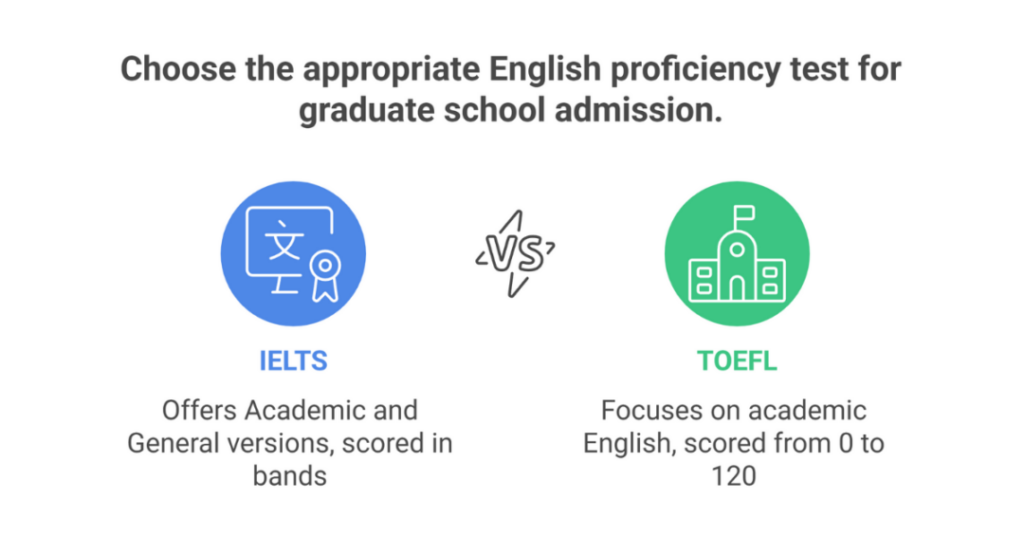
Syllabus:
| Section | Duration | Format | Content |
|---|---|---|---|
| Listening | 30 minutes (plus 10 minutes transfer time) | Four recorded monologues and conversations | Understanding main ideas and specific factual information from a variety of recordings. |
| Reading | 60 minutes | Three reading passages with tasks | Academic: Complex texts from books, journals, magazines, and newspapers. General Training: Texts relevant to everyday life and work settings. |
| Writing | 60 minutes | Two tasks | Task 1 (Academic): Describe visual information. Task 1 (General Training): Write a letter in response to a situation. Task 2: Write an essay on a given topic. |
| Speaking | 11-14 minutes | Face-to-face interview with an examiner | Part 1: Introduction and interview (4-5 minutes). Part 2: Long turn (2-3 minutes) on a given topic. Part 3: Two-way discussion (4-5 minutes) related to Part 2. |
IELTS Academic
The IELTS Academic test is intended for individuals who are applying for higher education or professional registration in an English-speaking country. The test is only available to take as a computer-based test although it may also be an internet-based test and it focuses on a candidate’s ability to identify and produce complex academic language.
The Academic version has three components: Listening, Reading, Writing and Speaking. The Reading component contains texts taken from books, journals, magazines and newspapers. The Writing component expects candidates to describe visual information and write essays.
This structure reflects the complexities of academic study in general and contains the complex language practices that students will encounter in higher education.
IELTS General Training
The IELTS General Training test is designed for candidates who are applying for migration to English-speaking countries for work, training programs, or secondary education. The test is presented as a computer-based test and internet-based test because the test is”practical”: it is examining candidates on their ability to engage in everyday skills.
Candidates take the Listening, Reading, Writing and Speaking components. The Reading component contains text that is relevant to day-to-day life and work settings. The writing component requires the candidates to write letters and essays.
This approach will help ensure that candidates are able to use English in a post-secondary level and in many of the situations they will encounter in a day-to-day live experience.
Full form of TOEFL (Test of English as a Foreign Language)
The acronym TOEFL exam means Test of English as a Foreign Language. The TOEFL iBT (Internet-Based Test) is a common English language proficiency test that measures non-native speakers’ ability to use and understand English in an academic setting.
The TOEFL iBT measures four skills: Reading, Listening, Speaking, and Writing, and the test is used for university admissions in some parts of the world. It is also accepted by many other institutions of higher education around the world.
The TOEFL iBT measures how well test takers can combine these skills to perform academic tasks, and therefore is usually a requirement to study the English language, on the university level, in English speaking countries.
The TOEFL iBT is an internet based test, which means it is a test that can be administered online, therefore providing a complete picture of the English language proficiency that is needed for higher education success.
Four Sections of TOEFL English Proficiency Exam
The TOEFL exam generally has four sections, namely reading, writing, listening, and speaking. Let us take a look at each of them:
Reading
Duration: 54-72 minutes
Content: 3-4 academic passages with 10 questions each, assessing reading comprehension.
Listening
Duration: 41-57 minutes
Content: 3-4 lectures and 2-3 conversations, with 5-6 questions per lecture/conversation, testing understanding of spoken English.
Speaking
Duration: 17 minutes
Content: 4 tasks requiring test-takers to express opinions and respond to reading and listening materials, evaluating spoken English skills.
Writing
Duration: 50 minutes
Content: 2 tasks: one integrated task (involving reading and listening) and one independent task (essay writing), measuring written English proficiency.
IELTS vs TOEFL Admission Test
When it comes time for you to choose between the TOEFL exam or the IELTS exam, there is a variety of aspects to consider such as the tests’ content and format, and institutional requirements for graduate applications. Both a TOEFL and an IELTS test assess English proficiency, and each is accepted by institutions for graduate school admissions in English speaking countries.
The IELTS has two versions, the IELTS Academic and the IELTS General training test. The IELTS Academic test is intended for individuals who will be using English to study in an academic learning environment, while the IELTS General is for individuals who are migrating to or working in an English speaking country. The IELTS has four assessments of Listening, Reading, Writing, and Speaking.
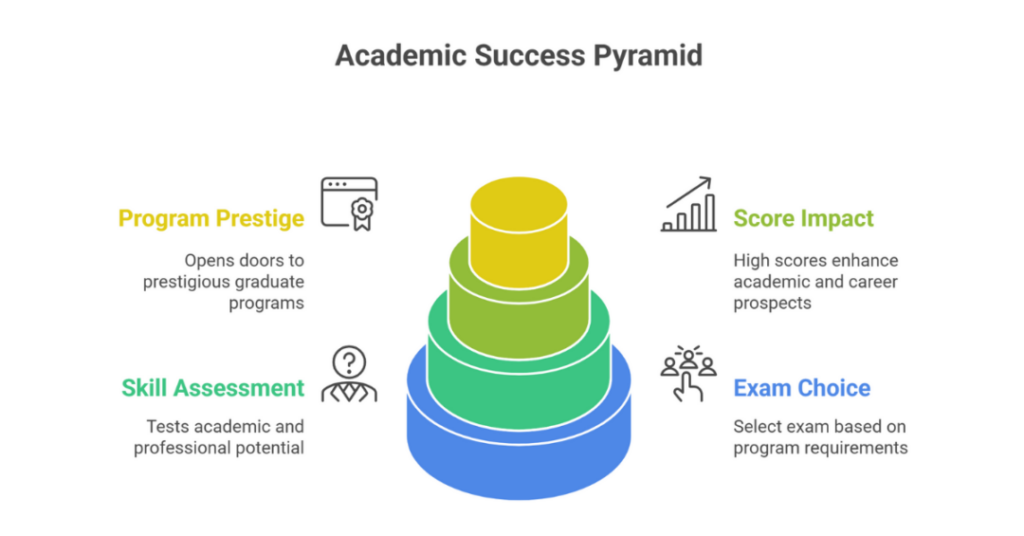
The IELTS scores (the test in English speaking countries) are given in band scores ranging from 1 to 9 (the requirement by each institution varies by minimum scores). The IELTS test is also offered both in computer-based test, and a paper-based format, as well as providing test takers with a basic score report of their raw scores and scaled scores.
The TOEFL is very popular, especially the TOEFL iBT, but other versions of the TOEFL test are options as well. Overall, the TOEFL is focused on academic English and is often required for university admissions. The content of the TOEFL exam targets Reading, Listening, Speaking, and Writing.
The TOEFL PBT (paper-based test) has the Test of Written English as an additional portion. The TOEFL scores range from 0 to 120, with each section being scored from 0 to 30. Another difference is minimum score threshold that schools have for minimum scores can differ, and TOEFL has also been widely accepted at many universities throughout the world.
There is nothing wrong with both the TOEFL vs IELTS test as English language proficiency tests. If your graduate school has very specific requirements, that will determine which test you should take. The dates you test and the locations of the test centers may also be weighing factors you’re deciding between.
Both tests test your conversation and comprehension skills in English, but the reporting system is different. As you review institutions, you should make sure you are submitting scores that meet the minimum requirements.
Neither test can guarantee you a score of 800 because the tests have different scoring systems. Just make sure you check what test is needed and accepted by your universities of choice first!
Conclusion
Standardized graduate admissions tests, including the GMAT, GRE, IELTS and TOEFL play an important role for students to gain acceptance to universities around the world. These exams test a variety of skills to determine students’ potential to succeed in their academic careers and ultimately provide students with an overall score that universities can use when comparing students.
While the GMAT is only applicable for graduate programs related to or offered by business schools, students from any number of academia can take the GRE. It is beneficial for you to understand the differences between GRE and GMAT exams and to choose the best exam for where you want to apply based on admission policy related to standardized exams.
This will allow you to either prepare for exams or apply for programs and increase your optential for admission. Whether you choose the GRE or GMAT, if you get a great score, there is a great likelihood to open up chances for graduate program prestige or increase the existing value of your academic and professional future. The same holds true for IELTS and TOEFL as well.
Master the GRE: Ambitio’s Bootcamp Will Elevate Your Scores! Dive deep into the GRE’s core sections with our comprehensive training and strategies, ensuring you excel across the board.
FAQs
What is the full form of GMAT GRE IELTS and TOEFL for study abroad applications?
The full form of GMAT GRE IELTS and TOEFL is important for students applying abroad. Knowing the full form of GMAT GRE IELTS and TOEFL helps in understanding which exam suits management, graduate, or language requirements. Universities often list the full form of GMAT GRE IELTS and TOEFL in eligibility criteria, making it essential for international students. The full form of GMAT GRE IELTS and TOEFL remains the first step toward preparing for admissions globally.
Why should Indian students know the full form of GMAT GRE IELTS and TOEFL?
For Indian students, the full form of GMAT GRE IELTS and TOEFL explains the purpose of each test. The full form of GMAT GRE IELTS and TOEFL also indicates which exam aligns with management, graduate, or English proficiency needs. By learning the full form of GMAT GRE IELTS and TOEFL, students avoid confusion while selecting the right test. Many counselors recommend beginning with the full form of GMAT GRE IELTS and TOEFL before starting preparation.
How does the full form of GMAT GRE IELTS and TOEFL help in choosing exams?
The full form of GMAT GRE IELTS and TOEFL helps categorize exams into management, graduate, and English tests. Students reviewing the full form of GMAT GRE IELTS and TOEFL can map exam requirements to their academic goals. Universities abroad often specify eligibility using the full form of GMAT GRE IELTS and TOEFL to guide applicants. Hence, knowing the full form of GMAT GRE IELTS and TOEFL is vital before registering.
Which exam suits you best based on the full form of GMAT GRE IELTS and TOEFL?
The full form of GMAT GRE IELTS and TOEFL highlights that GMAT is for management, GRE for graduate studies, and IELTS/TOEFL for language skills. International students analyzing the full form of GMAT GRE IELTS and TOEFL can decide based on course requirements. Selecting the right test after checking the full form of GMAT GRE IELTS and TOEFL ensures success. Ultimately, the full form of GMAT GRE IELTS and TOEFL acts as a guide for clarity.
Where do universities mention the full form of GMAT GRE IELTS and TOEFL?
Universities worldwide often include the full form of GMAT GRE IELTS and TOEFL on their admissions pages. Applicants searching for the full form of GMAT GRE IELTS and TOEFL find it in eligibility or English test requirements. Admission counselors also explain the full form of GMAT GRE IELTS and TOEFL during counseling sessions. Having access to the full form of GMAT GRE IELTS and TOEFL avoids misinterpretation of requirements.
How does the full form of GMAT GRE IELTS and TOEFL affect application documents?
The full form of GMAT GRE IELTS and TOEFL often appears in SOP, resume, and transcript requirements. Students using the full form of GMAT GRE IELTS and TOEFL ensure accuracy in applications. Many admission essays mention the full form of GMAT GRE IELTS and TOEFL while justifying test choices. Submitting documents with the full form of GMAT GRE IELTS and TOEFL reflects strong preparation.
Why is it important to repeat the full form of GMAT GRE IELTS and TOEFL when preparing?
Repeating the full form of GMAT GRE IELTS and TOEFL helps students remember exam categories clearly. Preparation guides often restate the full form of GMAT GRE IELTS and TOEFL to reduce confusion. Teachers emphasize the full form of GMAT GRE IELTS and TOEFL during coaching for clarity. Using the full form of GMAT GRE IELTS and TOEFL keeps students aligned with admission goals.

You can study at top universities worldwide!
Get expert tips and tricks to get into top universities with a free expert session.
Book Your Free 30-Minute Session Now! Book a call now




























